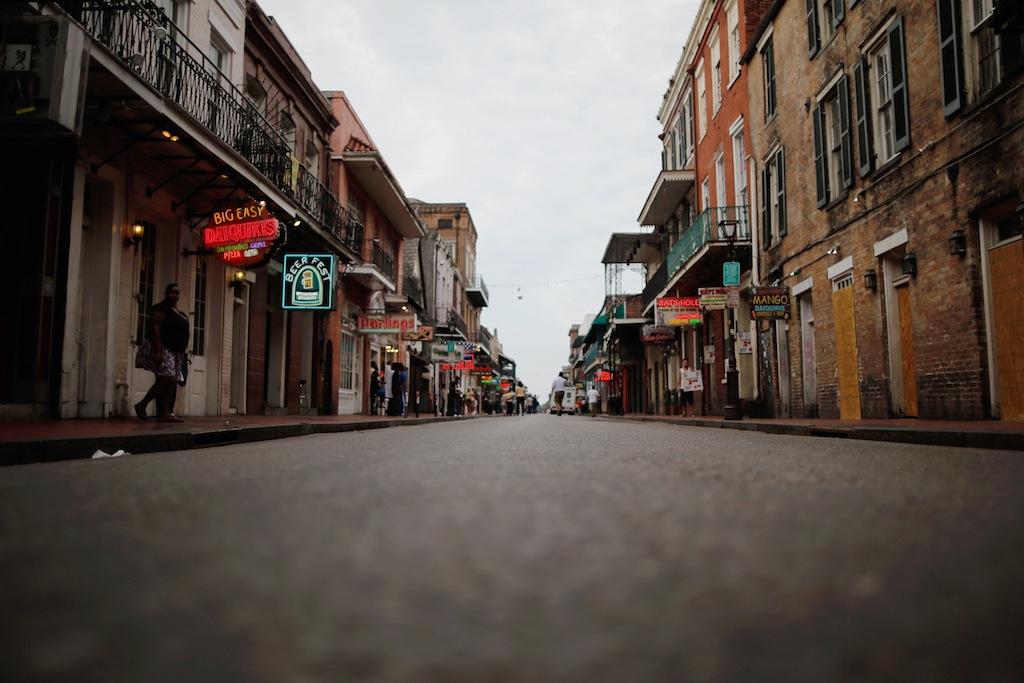Hurricane Isaac hits with force, flooding areas of Louisiana, Mississippi, on Katrina anniversary
Bourbon street remains vitrually empty ahead of Tropical Storm Isaac on Aug. 27, 2012 in New Orleans, Louisiana. Tropical Storm Isaac is expected to strengthen into at least a Category 1 hurricane before making landfall near Louisiana.
Hurricane Isaac continues to unleash its fury, lashing Louisiana with damaging 80 mile-per-hour winds and causing widespread flooding in New Orleans and other coastal cities.
Thousands of people have fled their homes as the storm landed at 3:15 a.m. EST just west of Port Fourchon, about 60 miles south-southwest of New Orleans, said the National Hurricane Center.
Reuters reported it was moving northwest at 6 to 8 miles per hour.
Flooding was reported in the low-lying Plaquemines Parish, closer to the mouth of the Mississippi River, forcing its 2000 residents to flee.
"On the east bank right now, we have reports of people on their roofs and attics and 12 to 14 foot of water (in their homes)," Iaquemines Parish Presdient, Billy Nungesser, told CNN.
"This storm has delivered more of a punch than people thought," he added.
New Orleans was hunkered down, preparing for flooding on the seventh anniversary of the much more powerful Hurricane Katrina, the Wall Street Journal reported.
While it was not as devastating as Katrina, which was a category 3, Isaac, with Category 1 winds up to 80 mph, was a threat that authorities said should not be underestimated.
The newspaper said 75% of New Orleans residents were without power and there was some minor street flooding, according to emergency officials.
Nungesser told NPR the damage was much more widespread than was being reported
"I don't know whose calling this a category 1, but this is no category 1," Nungesser said.
In a television interview this morning, Nungesser said the parish's levee had been overtopped and parts of the parish that had never flooded during a hurricane were under five feet of water.
"My house has more damage than it did during Katrina."
WWLTV interviewed a man who was in his attic with his wife and his 1-year-old child after the water reached the top door frame in the first floor. He said it had stopped rising.
President Obama declared states of emergency in Louisiana and Mississippi on Monday ahead of Hurricane Isaac's Gulf Coast landfall.
Hurricane Katrina, which killed more than a thousand people and caused billions of dollars in damage, was a Category 5, the highest classification a storm can have in the Saffir-Simpson scale. It sustained winds of 156.5 mph.
Obama's declaration means federal resources are available to assist Louisiana and Mississippi. The Federal Emergency Management Agency (FEMA) will now work with state and local officials to provide disaster relief.
The White House said "forecasters with the National Weather Center are tracking the path of the storm, while federal disaster response teams are already in place throughout the Gulf region, coordinating with state response centers.
Obama gave a short statement on approaching Hurricane Issac earlier today.
Louisiana Gov. Jindal, who requested the emergency declaration in his state, was not entirely pleased with the federal government's response. In a public letter to the White House he said:
"We appreciate your response to our request and your approval. However, the State’s original request for federal assistance … included a request for reimbursement for all emergency protective measures. The federal declaration of emergency only provides for direct federal assistance."
Jindal added in the letter:
"The State’s expenditures for emergency protective measures are already approximately $8,000,000 and exceed the State of Louisiana’s threshold when making a request for a major disaster declaration."
Since Katrina, Louisiana has bolstered itself with a new, $14.5 billion flood control system.
"Isaac has finally formed into a hurricane, so we are officially in the fight and the city of New Orleans is on the front lines," said New Orleans Mayor Mitch Landrieu on Tuesday, according to Reuters. "Citizens have to be prepared. I'm going to ask you to hunker down."
Reuters also reported that hundreds of US Army National Guard troops took up positions around New Orleans armed with assault rifles to ward off any threat of looting.
It's important to understand that while Louisiana's traumatic past garners it considerable attention, people in others states also face considerable risk. FEMA chief Craig Fugate said, "This is not a New Orleans storm. This is a Gulf Coast storm. Some of the heaviest impact may be in Alabama and Mississippi."
The story you just read is accessible and free to all because thousands of listeners and readers contribute to our nonprofit newsroom. We go deep to bring you the human-centered international reporting that you know you can trust. To do this work and to do it well, we rely on the support of our listeners. If you appreciated our coverage this year, if there was a story that made you pause or a song that moved you, would you consider making a gift to sustain our work through 2024 and beyond?
